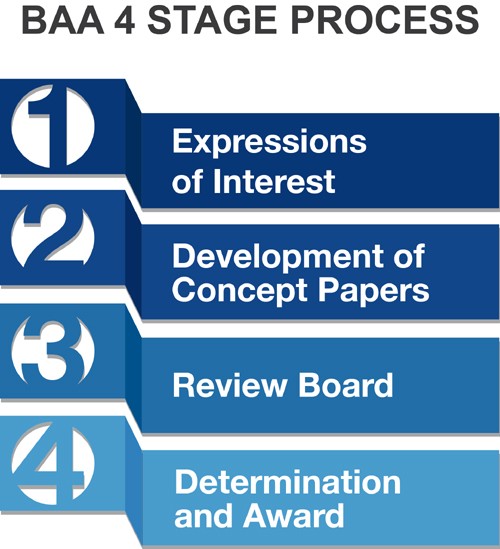Speeches Shim

The USAID BAA is Four (4) Stage Process from the expression of interest to award. The pre-stage/planning portion includes creating a team within USAID that includes program staff, legal, procurement, and possibly other donors/external partnerships/experts in a particular field.
Timelines are developed and the four (4) stage process begins:
Stage 1 Expressions of Interest
The BAA and/or Addendum is posted to both FedBizOpps and Grants.gov. Once posted, the team is allowed to let industry know of the opportunity and post to any other sites or trade groups for maximum visibility to the public.
Expressions of Interest must indicate the research or development idea which will work towards discovering potential solutions to a Problem and Challenge Statement, by increasing knowledge and understanding of potential solutions, exploiting scientific discoveries or improvements in technology, materials, processes, methods, devices, or techniques, advancing the state of the art, or using scientific and technical knowledge in the design, development, testing, or evaluation of a potential new product or service (or of an improvement in an existing product or service).
If your expression of interest is not accepted, you will receive correspondence stating that and you will not move on to Stage 2. For Expressions of Interest which are deemed to have merit by USAID and pass criteria/eligibility stated within the BAA and/or specific addenda, USAID will issue an invitation to collaborate to the potential partner.
Stage 2 Development of Concept Paper
Working together, USAID and the potential partner(s) will collaborate on a Concept Paper. It is during this phase of co-creation and co-design that the parties will begin to determine additional partners and resources to complement the project. The Concept Paper, generally 5-10 pages, will further detail and explain the project as initially provided in the Expression of Interest.
An invitation is sent to potential partners to participate in a co-creation workshop, conference, meeting, or the method designated by USAID to work together with all invitees to further the develop the idea presented in the expression of interest. Organizations not willing to share their ideas with others may not find this process to advantageous. This process calls for working together with organizations that may or may not be new to you.
All potential partners may not move forward to Stage 3.
Stage 3 Review Board
Concept Papers developed during Stage 2 will be reviewed by the Peer and Scientific Review Board, comprised of experts from USAID, partners, and/or outside parties. The Peer and Scientific Review Board will review Concept Papers and recommend which applicants should be considered Apparently Successful Partners to the Contracting/Agreement Officer. Using its technical expertise, the Peer and Scientific Review Board will recommend whether to move forward with the project including revisions/additions to the project, and potential partners and resources.
While it is not required, potential partners are welcome to sit in on their own peer and scientific review board with their co-creation/development team.
All potential partners may not move forward to Stage 4. Evaluations are typically done on a green/amber/red light basis.
Stage 4 Determination and Award
The Contracting/Agreement officer will review the Peer and Scientific Review Board’s recommendations and consider other information, such as resource availability, preliminary partner responsibility assessment, and Agency priorities, and will make a determination whether the respondent is an Apparently Successful Partner. The Contracting/Agreement Officer may also make or narrow down the anticipated instrument type to facilitate project design.
The USAID Contracting/Agreement Officer will engage in final review, negotiation, and determinations of instrument type, responsibility, cost reasonableness, etc., and will craft an award instrument with the Apparently Successful Partner. If the Apparently Successful Applicant and USAID cannot arrive at a mutually agreeable arrangement, the Contracting/Agreement Officer will cancel the project at no cost to the Government.
For Additional Information on BAAs click here.
For Additional Notes on Co-Creation, click here

Comment
Make a general inquiry or suggest an improvement.